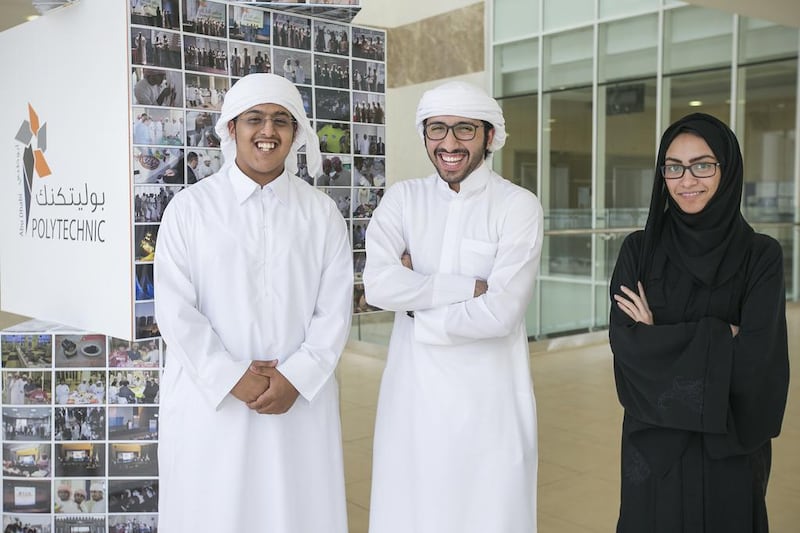ABU DHABI // The first batch of Emirati nuclear-technology graduates will be ready to start their careers this weekend.
Seventeen students at Abu Dhabi Polytechnic, who specialised in various areas of nuclear energy, will be able to use their skills at the Emirates Nuclear Energy Corporation for the next three years.
“This is a unique programme and the first that was provided from any university in the UAE in nuclear engineering,” said Abdelrahman Al Khamiri, a 21-year-old graduate from Sharjah.
“My aim was to work in the energy sector in the UAE, so I chose nuclear energy. It is a new type of energy that will help to serve the UAE. I specialised in the operation of a nuclear power plant.”
He and his fellow student, Abdulaziz Hashim, along with 15 others will graduate on Saturday in the capital.
Mr Hashim said: “I think we will be the first ones in the Middle East to work in the nuclear industry so it is an amazing experience.
“It’s a great first opportunity for people from the Arabian Gulf to work in such an industry, especially because it’s difficult to be a nuclear engineer.”
Mr Hashim, who specialised in being a nuclear power operator, said he was ready to work in any nuclear plant.
“We went to [South] Korea as part of an internship and managed to see the actual system, how pumps worked, how we could use the valves,” he said. “It was really an amazing experience to enter a power plant for the first time.”
Although the three-year programme started with 42 students, only 17 will graduate. But its popularity is growing among Emiratis.
“I think nuclear power is exotic but it is an easy concept and straightforward when you learn about the different processes and radioactive material,” said Dr Anthony Edward Hechanova, the head of Advanced Energy Engineering Technology at the polytechnic.
“I’ve seen interest growing. Nuclear power requires a very keen respect of safety at all levels, more so than any other industry, except maybe aerospace.”
The programme includes an internship in the Shin Kori nuclear power plant in South Korea.
“We have 47 students there right now,” said Dr Hechanova.
Muna Al Suwaidi, 19, will start her four and a half month internship at the South Korean plant in October.
“It’s a great opportunity for women to make something of themselves in this industry,” said the Emirati.
“It was shocking for my parents at first because they thought it was dangerous because of the material I would deal with, so they were scared for my safety.
“But they were still supportive. I think all women can work in this field.”
The first internship takes place in the second year at the Korean plant and allows students to pick a specialisation.
These include plant operator, mechanical engineering technologist, electrical technologist, instrumentation and control as well as chemistry and radiation protection.
“It is a familiarisation by going through all the systems and shift work,” said Dr Hechanova.
“So they see all the different technical jobs and they spend a week shadowing each of the different shifts.”
The second internship, at the same site in their third year, involves on-the-job training in the specialisation they chose for five and a half months.
During the programme at Abu Dhabi Polytechnic, the students also take classes in maths, sciences, and engineering.
“The programme was designed with the industry in mind,” said Dr Hechanova. “What’s important is that we give the students what they need to succeed. We’re not teaching French or literature. It puts us in a focused career path.”
The programme will move to the Barakah nuclear power plants in Al Gharbia in 2017 or 2018 once they become operational.
About 25 per cent of Abu Dhabi’s power needs will come from these plants when they come on stream.
The students will be able to train there before signing a contract with the Emirates Nuclear Energy Corporation for their first three years.
cmalek@thenational.ae






